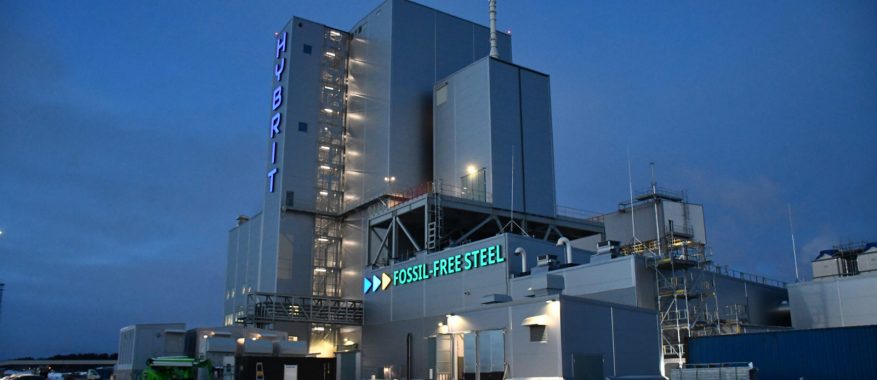How to get a favorable industry climate in Sweden
- 2021-06-02
- 11:42
- News

Photo: Åsa Bäcklin/HYBRIT
Sweden is privileged with a large industrial production. It benefits us all when the Swedish economy restarts after the pandemic. A quarter of this year’s GDP increase is expected to come from industry and investment is expected to increase by eleven percent. But if the industry is to continue to invest, create growth and new jobs here in Sweden, both predictable and favorable conditions are required, says the steering group for the Industry’s Reform Agenda in a debate article in Norrbottens-Kuriren.
The Industry’s reform agenda describes what Swedish industry needs in order to be able to best contribute to accelerating growth and strengthening the competitiveness of Swedish industry. Behind the reform agenda are Svemin and thirteen other leading industry and employer organizations in Sweden.
The debate article in Norrbottens-Kuriren highlights three proposals for this autumn’s budget bill that can contribute to a more favorable industry climate. The proposals, which are part of Industry’s reform agenda, are not about increasing public spending, but about which strategic investments the policy needs to prioritize.
More efficient permit processes. Both the climate transition and the creation of new jobs are strongly dependent on how quickly new investments in infrastructure and industries can be made. In the way of these investments today are inefficient and unpredictable permit processes. A budget investment is needed to increase the capacity of the courts in particular. Clear directives are also needed for the relevant authorities to promote development projects instead of unilaterally safeguarding vaguely defined environmental interests. Set requirements for collaboration instead of counteraction. It is a first step on the journey of change for more efficient permit processes that must take place.
Strengthened competence supply. Lack of current and relevant skills constitutes a brake on development in the industry. The matching in the labor market is deficient and therefore the education system must be better dimensioned to meet the needs of business and industry. Let examples like Teknikcollege be a role model and create a better collaboration between municipalities, business and schools. Increased collaboration is needed to broaden the range, strengthen the quality and enable more young people to choose educations with a strong connection to the labor market. Make vocational programs more attractive by reintroducing basic higher education qualifications, adapting vocational adult education so that it can be used both for those without education and for career changers. In addition, the education system should be given the conditions to also further and supplementary train professionals.
Fix the maintenance debt for the transport infrastructure. The maintenance debt in roads and railways continues to grow despite the fact that the total budget in the presented infrastructure bill has increased. Insufficient and poor quality of transport infrastructure throughout the country makes it difficult for both industrial investment and freight transport. Now is the right time to make up for the long-term backlog of maintenance on state roads and railways in order to bring forward measures that increase the bearing capacity and passability of significant freight lanes and sections where the problems are greatest. There is a need for politically broad-based goals for both road and rail on when the maintenance debt should be addressed, with a number of control stations along the way. There is also a need for a targeted government investment in the municipalities linked to maintenance and infrastructure investments for freight transport.
> Read the debate article in Norrbottens-Kuriren (swe)
> More about the Industry’s Reform Agenda (swe)
About
The Industry’s Reform Agenda was launched on 25 November 2020. The agenda contains 12 reform areas for how Sweden will be ranked as one of the world’s five most competitive countries by 2025. Behind the agenda are 14 organizations representing the entire Swedish industry:
- Byggmaterialindustrierna (The Construction Materials Industries)
- Gröna arbetsgivare (The Swedish Federation of Green Employers)
- Grafiska Företagen (The Swedish Graphic Industries Federation)
- IKEM – Innovations- och Kemiindustrierna (Innovation and Chemical Industries in Sweden)
- Industriarbetsgivarna (The Swedish Association of Industrial Employers)
- Jernkontoret (The Swedish Iron and Steel Producers’ Association)
- Livsmedelsföretagen (The Swedish Food Federation)
- SBMI, Sveriges Bergmaterialindustri (Swedish Aggregates Producers Association)
- Skogsindustrierna (The Swedish Forest Industries Federation)
- Svemin (The Swedish Association of Mines, Mineral and Metal Producers)
- Teknikföretagen (The Association of Swedish Engineering Industries)
- TEKO, Sveriges Textil- och Modeföretag, (The Swedish Trade and Employers’ Association for Textile and Fashion Industry)
- TMF, Trä- och Möbelföretagen, (The Swedish Federation of Wood and Furniture Industry)
- Återvinningsindustrierna (The Industry Organization for Private Recycling Companies in Sweden)